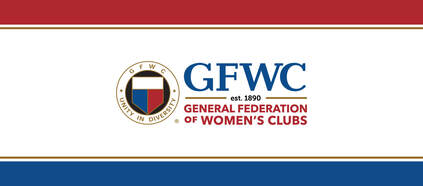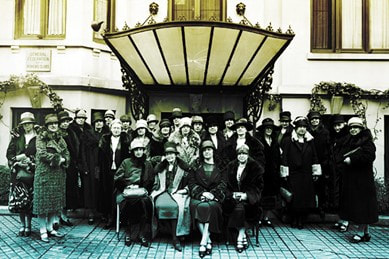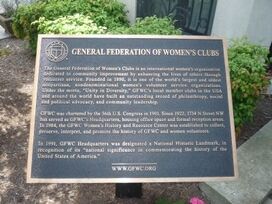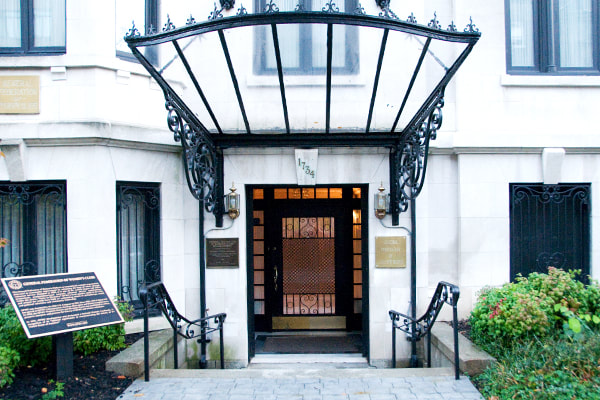About GFWC
Since it was founded in 1890, the General Federation of Women's Clubs has been a unifying force, bringing together local women's clubs from around the country and throughout the world. Although there is considerable diversity in the ages, interests, and experiences of GFWC clubwomen, all are united by a dedication to community improvement through volunteer service.
GFWC’s roots can be traced back to 1868 when Jane Cunningham Croly, a professional journalist, attempted to attend a dinner at an all-male press club honoring British novelist Charles Dickens. Croly was denied admittance based upon her gender, and in response, formed a woman’s club - Sorosis. In celebration of Sorosis’ 21st anniversary in 1889, Jane Croly invited women’s clubs throughout the United States to pursue the cause of federation by attending a convention in New York City. On April 24, 1890, 63 clubs officially formed the General Federation of Women’s Clubs by ratifying the GFWC constitution.
Since 1890, GFWC’s impact has been felt throughout communities across the United States and the globe.
Click here for the history and mission of GFWC.
With 60,000 members in affiliated clubs in every state, the District of Columbia, and more than a twenty countries, GFWC members work in their own communities to support the arts, preserve natural resources, advance education, promote healthy lifestyles, encourage civic involvement, and work toward world peace and understanding.
GFWC’s Impact
Child Labor Laws, 1898: GFWC unanimously passed a resolution against child labor. With the help of clubwoman Jane Addams (1860-1935), child labor became a major area of concern for the Federation. In 1901, Addams headed the Federation’s Child Labor Committee to work for the maintenance and improvement of child labor laws.
Juvenile Courts, 1899: GFWC’s Chicago Woman’s Club supported the juvenile court law, the first ever to be passed in the United States. This law became the model for all subsequent juvenile court laws, many of which were passed at the insistence of GFWC clubwomen. Julia Lathrop (1858-1932) led this club effort and was appointed by President William Howard Taft to head the Children’s Bureau in 1912.
8-hour Workday, 1910s: GFWC supported legislation for the eight-hour workday, workplace safety and inspection, and workmen’s compensation. Members also supported prison reform legislation.
Pure Food and Drug Act, 1906: GFWC member Alice Lakey (1857-1935) spearheaded a letter and telegram writing campaign, which was essential to the passage of the Pure Food and Drug Act. Dr. Harvey Wiley, the first chief of the Pure Food Bureau, attributed the bill’s passing to GFWC and stated, “Trust them [GFWC] to put the ball over the goal line every time.”
Women’s Right to Vote, 1934: GFWC began a 10-year study to review the question of the Equal Rights Amendment (ERA). In 1944, GFWC adopted a resolution in support of the ERA, which the Federation continues to support today.
Free Public Libraries, 1930s: Having founded over 474 free public libraries and 4,655 traveling libraries, women’s clubs were credited by the American Library Association with establishing 75 percent of America’s public libraries. Supporting local libraries continues to be a Federation priority today.
United Nations Charter 1945: GFWC was one of the five women’s organizations chosen to participate in the conference to form the United Nations. At the conference, GFWC representatives supported the ratification of the United Nations Charter.
Women’s Crusade for Seat Belts,1961: GFWC’s Women’s Crusade for Seat Belts program resulted in the installation of more than one million seat belts over the course of one year.
Violence Against Women Act, Family, Americas with Disabilities Act, and Medical Leave Act, 1990s: GFWC actively supported the passage of the Violence Against Women Act; the Americans With Disabilities Act; the Family and Medical Leave Act; and legislation supporting handgun control.
Today: Collectively clubmembers have called/emailed their legislative representatives to support current legislation:
GFWC’s roots can be traced back to 1868 when Jane Cunningham Croly, a professional journalist, attempted to attend a dinner at an all-male press club honoring British novelist Charles Dickens. Croly was denied admittance based upon her gender, and in response, formed a woman’s club - Sorosis. In celebration of Sorosis’ 21st anniversary in 1889, Jane Croly invited women’s clubs throughout the United States to pursue the cause of federation by attending a convention in New York City. On April 24, 1890, 63 clubs officially formed the General Federation of Women’s Clubs by ratifying the GFWC constitution.
Since 1890, GFWC’s impact has been felt throughout communities across the United States and the globe.
Click here for the history and mission of GFWC.
With 60,000 members in affiliated clubs in every state, the District of Columbia, and more than a twenty countries, GFWC members work in their own communities to support the arts, preserve natural resources, advance education, promote healthy lifestyles, encourage civic involvement, and work toward world peace and understanding.
GFWC’s Impact
Child Labor Laws, 1898: GFWC unanimously passed a resolution against child labor. With the help of clubwoman Jane Addams (1860-1935), child labor became a major area of concern for the Federation. In 1901, Addams headed the Federation’s Child Labor Committee to work for the maintenance and improvement of child labor laws.
Juvenile Courts, 1899: GFWC’s Chicago Woman’s Club supported the juvenile court law, the first ever to be passed in the United States. This law became the model for all subsequent juvenile court laws, many of which were passed at the insistence of GFWC clubwomen. Julia Lathrop (1858-1932) led this club effort and was appointed by President William Howard Taft to head the Children’s Bureau in 1912.
8-hour Workday, 1910s: GFWC supported legislation for the eight-hour workday, workplace safety and inspection, and workmen’s compensation. Members also supported prison reform legislation.
Pure Food and Drug Act, 1906: GFWC member Alice Lakey (1857-1935) spearheaded a letter and telegram writing campaign, which was essential to the passage of the Pure Food and Drug Act. Dr. Harvey Wiley, the first chief of the Pure Food Bureau, attributed the bill’s passing to GFWC and stated, “Trust them [GFWC] to put the ball over the goal line every time.”
Women’s Right to Vote, 1934: GFWC began a 10-year study to review the question of the Equal Rights Amendment (ERA). In 1944, GFWC adopted a resolution in support of the ERA, which the Federation continues to support today.
Free Public Libraries, 1930s: Having founded over 474 free public libraries and 4,655 traveling libraries, women’s clubs were credited by the American Library Association with establishing 75 percent of America’s public libraries. Supporting local libraries continues to be a Federation priority today.
United Nations Charter 1945: GFWC was one of the five women’s organizations chosen to participate in the conference to form the United Nations. At the conference, GFWC representatives supported the ratification of the United Nations Charter.
Women’s Crusade for Seat Belts,1961: GFWC’s Women’s Crusade for Seat Belts program resulted in the installation of more than one million seat belts over the course of one year.
Violence Against Women Act, Family, Americas with Disabilities Act, and Medical Leave Act, 1990s: GFWC actively supported the passage of the Violence Against Women Act; the Americans With Disabilities Act; the Family and Medical Leave Act; and legislation supporting handgun control.
Today: Collectively clubmembers have called/emailed their legislative representatives to support current legislation:
- Miranda's Law - S: 1787, HR: 2793 which aims to keep unsafe drivers from behind the wheel of school buses. (named after Miranda Vargas, she and her teacher Jennifer Williamson were tragically killed in a bus accident; the bus driver was found to have had more than 14 license suspensions at the time of the crash. Action on September 23, 2019.
- 3D Gun Safety Printing Act - S: 1831, HR: 3265 which prohibits the distribution of 3D printer plans for the printing of firearms. (sponsored by MA Senator Markey) action on October 23, 2019.
- Violence Against Women Reauthorization Act of 2019 - HR 1585- which includes narrowly focused enhancements to address gaps identified by victims and survivors of domestic and sexual violence and the people who work with them.
- Celebrating the Centennial ~ 100 Years of Voting Rights for Women - S: 2427, HR 1923 which asks people to contact Congress in support of commemorative coins honoring the centennial of women’s suffrage!
GFWC Headquarters is located at 1734 N Street NW, Washington, DC 20036
Click here for 125 facts about the General Federation of Women's Club.
Click here for 125 facts about the General Federation of Women's Club.



